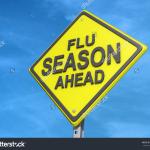Here's the real talk from Dr. Dinerstein: "This year, the Subclade K strain is predominant and is not explicitly covered by the flu vaccination. That said, the vaccine does afford some protection.
flu shot
This is the video version of the latest article by Dr. Josh Bloom on flu vaccines. You can read it here.
I've been in science communication for over 8 years. If there's only one thing I learned, it's this: People don't respond to facts.
By Matthew Motta, University of Pennsylvania;
Making the rounds in the news media is a serious medical condition called acute flaccid myelitis (AFM). It predominantly occurs in children causing among other symptoms weakness in the extremities.
The flu has arrived in the U.S. for the 2018-2019 season. Kentucky just reported its first flu-related death.
As ACSH's Ana Dolaskie approaches the final weeks of pregnancy, she is making sure all her vaccinations are up-to-date. This includes the TDAP vaccine (Tetanus-Diphtheria-Pertussis) and influenza shot.
Every year, the recommended childhood and adolescent vaccine schedules are reviewed, adjusted and approved by the following governing bodies: American Academy of Pediatrics (AAP), Advisory Committee on Immunization Practices of the Centers f










